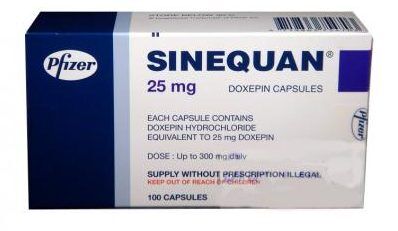Sinequan (Doxepin)

Dosages
Sinequan 10 mg
| Quantity | Price per pill | Total price | |
|---|---|---|---|
| 180 | $0.30 | $54.00 | |
| 360 | $0.27 | $97.00 |
Sinequan 25 mg
| Quantity | Price per pill | Total price | |
|---|---|---|---|
| 30 | $1.97 | $59.00 | |
| 60 | $1.48 | $89.00 | |
| 90 | $1.33 | $120.00 | |
| 120 | $1.26 | $151.00 | |
| 180 | $1.18 | $212.00 | |
| 270 | $1.13 | $305.00 | |
| 360 | $1.11 | $399.00 |
Sinequan 75 mg
| Quantity | Price per pill | Total price | |
|---|---|---|---|
| 30 | $1.73 | $52.00 | |
| 60 | $1.37 | $82.00 | |
| 90 | $1.26 | $113.00 | |
| 180 | $1.14 | $205.00 | |
| 270 | $1.10 | $297.00 | |
| 360 | $1.08 | $388.00 |
Payment & Shipping
Your order is securely packed and usually ships within 24 hours. Below is what a standard package looks like.
It is about the size of a regular letter (9.4x4.3x0.3 inches) and shows no details about what is inside.



| Shipping Method | Estimated delivery |
|---|---|
| Express Free for orders over $300.00 | Estimated delivery to the U.S.: 4-7 days |
| Standard Free for orders over $200.00 | Estimated delivery to the U.S.: 14-21 days |









Discount Coupons
- Independence Day - July 4, 2026 10% JULY410
- Labor Day - September 7, 2026 7% LABOR07
- Thanksgiving - November 26, 2026 9% THANKS09
Brand Names
| Country | Brand Names |
|---|---|
 Argentina Argentina | Doxederm |
 Australia Australia | Deptran |
 Belgium Belgium | Quitaxon |
 Canada Canada | Triadapin Zonalon |
 Denmark Denmark | Quitaxon |
 Finland Finland | Doxal |
 France France | Quitaxon |
 Germany Germany | Aponal Desidoxepin Doneurin Doxe Doxepia espadox Mareen Sinquan |
 New Zealand New Zealand | Anten |
 United States United States | Adapin Prudoxin Zonalon |
| Manufacturer | Brand Names |
|---|---|
| Solus Pharmacy | Spectra |
FAQ
Description
What is Sinequan?
Sinequan is a popular medication that is known as a tetracyclic antidepressant. It is prescribed for the treatment of psychotic depressive disorders, depression, posttraumatic stress disorder (PTSD), and anxiety, including clues of fibromyalgia and chronic pain.
Sinequan, as a tricyclic antidepressant, should not be used with monoamine oxidase inhibiting drugs (MAOI) because high fever, convulsions, and even death may occur from such combinations.
Sinequan is not approved for use in children under 12. Always tell a healthcare professional before giving Sinequan to a child.
Your doctor may prescribe this remedy for other purposes. Contact your physician if you need to learn more information about this drug.
Don't stop treatment with Sinequan earlier than it was prescribed by your doctor, even if you notice improvements in your condition. Stopping the medication too early may worsen your condition. Be careful about doing dangerous tasks, driving, operating machinery, or climbing until you are aware of how this drug affects you.
What Symptoms or Conditions Should I Report to a Doctor Before I Take This Medicine?
It is important to report to a doctor if you have or have had the following conditions:
- heart disorders, heart attack, stroke, or high blood pressure;
- liver or kidney disease;
- an unusual or allergic reaction to doxepin, other medicines, foods, dyes, or preservatives;
- asthma;
- diabetes;
- enlarged prostate or difficulty urinating;
- stomach or intestinal problems;
- seizures or epilepsy;
- glaucoma;
- pregnancy, breastfeeding, or planning to become pregnant.

How to Take Sinequan?
Note: This remedy was prescribed to you only. Do not share this medication with others. Follow strictly your doctor's prescription. Do not take more or longer than your doctor recommended.
This medicament is presented as capsules or liquid to be taken orally.
The recommended starting dose of this medicine is 25 mg. It is usually recommended to take the medicine 1 to 3 times daily, at around the same time(s) every day. Dosages above 500 mg per day are not recommended.
This medicine is usually accompanied by some liquid. To protect your kidneys, it is important to drink several glasses of water each day while you are taking Sinequan. You may take it on a full or empty stomach. Combining it with food is advisable to minimize stomach irritation and help your body absorb the drug.
The capsules should be swallowed whole. Do not crush, break, chew, or open them. Shake the suspension well before each use to mix the medication evenly. Use a specially marked measuring spoon or medicine cup to ensure the correct dose. Do not use this amount unless your healthcare provider specifically instructs you to do so.
What Should Be Done If I Missed the Dose?
In case you forgot to take the dose, take it at your earliest opportunity. Never double your dose if it is almost time for your next dose. Take only one dose at once.
Overdosage
Taking any medicine in large doses can have serious consequences for your health. If you are overdosed, visit your doctor straight away.
In large doses, Sinequan may cause coma, delirium, shock, or agitation.
Interactions
- Anticholinergic medications (Atropine, Belladonna, Clidinium, Dicyclomine, Glycopyrrolate);
- Arrhythmia medications (Amiodarone, Disopyramide, Flecainide, Propafenone);
- Cimetidine (Tagamet);
- Phenothiazine medications (Chlorpromazine, Trifluoperazine, Thioridazine);
- SSRI or SNRI medications (Citalopram, Escitalopram, Sertraline);
- Tolazamide (Tolinase);
- tricyclic antidepressants (Amitriptyline, Maprotiline, Trimipramine).
This list of interactions may not be complete. Provide your medical practitioner with an entire list of medicines, herbs, dietary supplements, or non-prescription drugs you take. Moreover, tell them whether you drink alcohol, use illegal drugs, or smoke. Particular items may interact with your drug.
Which Side Effects Can I Perceive from This Remedy?
- Allergic reaction (difficulty breathing; skin rash or swelling; swelling of your throat, lips, tongue or face; hives; itching).
- Loss of appetite.
- Weight changes.
- Fast/pounding/irregular heartbeat (palpitations).
- Mental mood changes (abnormal dreams, abnormal thinking, loss of contact with reality, restlessness, confusion, hallucinations, blurred vision).
- Problems with breathing and chest pain.
- Sore throat, chills, and fever.
- Numbness, tingling in your hands or feet (tremor), muscle stiffness, or spasms.
- Indigestion, upset stomach, bloating, stomach gas, pain, or cramps.
- Nausea, vomiting.
- Unusual bleeding or bruising.
- Headache, dizziness, ringing in your ears, or hearing loss.
- Difficulty urinating (urinary retention), diarrhea.
- Low blood pressure.
- Liver problems, yellowing eyes, skin.
If these persist or worsen, notify your doctor immediately. This is not a complete list of side effects, and others may occur. Contact your doctor or pharmacist if you have other reactions not mentioned above.
How Should Sinequan Be Stored?
Sinequan should be stored in a tightly closed container at room temperature, between 15 and 30 degrees C (59 and 86 degrees F). It should be protected from moisture, direct heat, and light. It should not be stored in the bathroom or near a sink. It should also be kept out of the reach of children and away from animals.
With regard to the treatment of several mental health issues, especially anxiety and depression, Sinequan is a significant improvement. The effectiveness of this medication in reducing symptoms, along with its low frequency of side effects, highlights its significance in contemporary mental health treatment. To achieve the best possible results and enhance the quality of life, patients and their healthcare providers must collaborate closely to develop the most suitable treatment plan, just like with any drug.
















